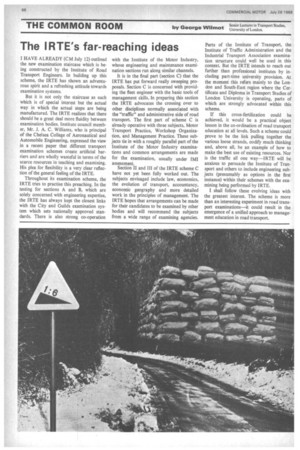The I RTE's far-reaching ideas
Page 68

If you've noticed an error in this article please click here to report it so we can fix it.
I HAVE ALREADY (CM July 12) outlined the new examination staircase which is being constructed by the Institute of Road Transport Engineers. In building up this scheme, the IRTE has shown an adventurous spirit and a refreshing attitude towards examination systems.
But it is not only the staircase as such which is of special interest but the actual way in which the actual steps are being manufactured. The IRTE realizes that there should be a great deal more fluidity between examination bodies. Institute council member, Mr. J. A. C. Williams, who is principal of the Chelsea College of Aeronautical and Automobile Engineering, expressed the view in a recent paper that different transport examination schemes create artificial barriers and are wholly wasteful in terms of the scarce resources in teaching and examining. His plea for flexibility is a very clear reflection of the general feeling of the IRTE.
Throughout its examination scheme, the IRTE tries to practise this preaching. In the testing for sections A and B, which are solely concerned with engineering expertise, the IRTE has always kept the closest links with the City and Guilds examination system which sets nationally approved standards. There is also strong co-operation with the Institute of the Motor Industry, whose engineering and maintenance examination sections run along similar channels.
It is in the final part (section C) that the IRTE has put forward really sweeping proposals. Section C is concerned with providing the fleet engineer with the basic tools of management skills. In preparing this section the IRTE advocates the crossing over to other disciplines normally associated with the "traffic" and administrative side of road transport. The first part of scheme C is already operative with three subjects, Motor Transport Practice, Workshop Organization, and Management Practice. These subjects tie in with a roughly parallel part of the Institute of the Motor Industry examinations and common arrangements are made for the examination, usually under IMI assessment.
Section II and III of the IRTE scheme C have not yet been fully worked out. The subjects envisaged include law, economics, the evolution of transport, accountancy, economic geography and more detailed work in the principles of management. The IRTE hopes that arrangements can be made for their candidates to be examined by other bodies and will recommend the subjects from a wide range of examining agencies. Parts of the Institute of Transport, the Institute of Traffic Administration and the Industrial Transport Association examination structure could well be used in this context. But the IRTE intends to reach out further than professional institutes by including part-time university provision. At the moment this refers mainly to the London and South-East region where the Certificate and Diploma in Transport Studies of London University is operating, parts of which are strongly advocated within this scheme.
If this cross-fertilization could be achieved, it would be a practical object lesson in the co-ordination of road transport education at all levels. Such a scheme could prove to be the link pulling together the various loose strands, codify much thinking and, above all, be an example of how to make the best use of existing resources. Nor is the traffic all one way—IRTE will be anxious to persuade the Institute of Transport and others to include engineering subjects (presumably as options in the first instance) within their schemes with the examining being performed by IRTE.
I shall follow these evolving ideas with the greatest interest. The scheme is more than an interesting experiment in road transport examinations—it could result in the emergence of a unified approach to management education in road transport.












































































































